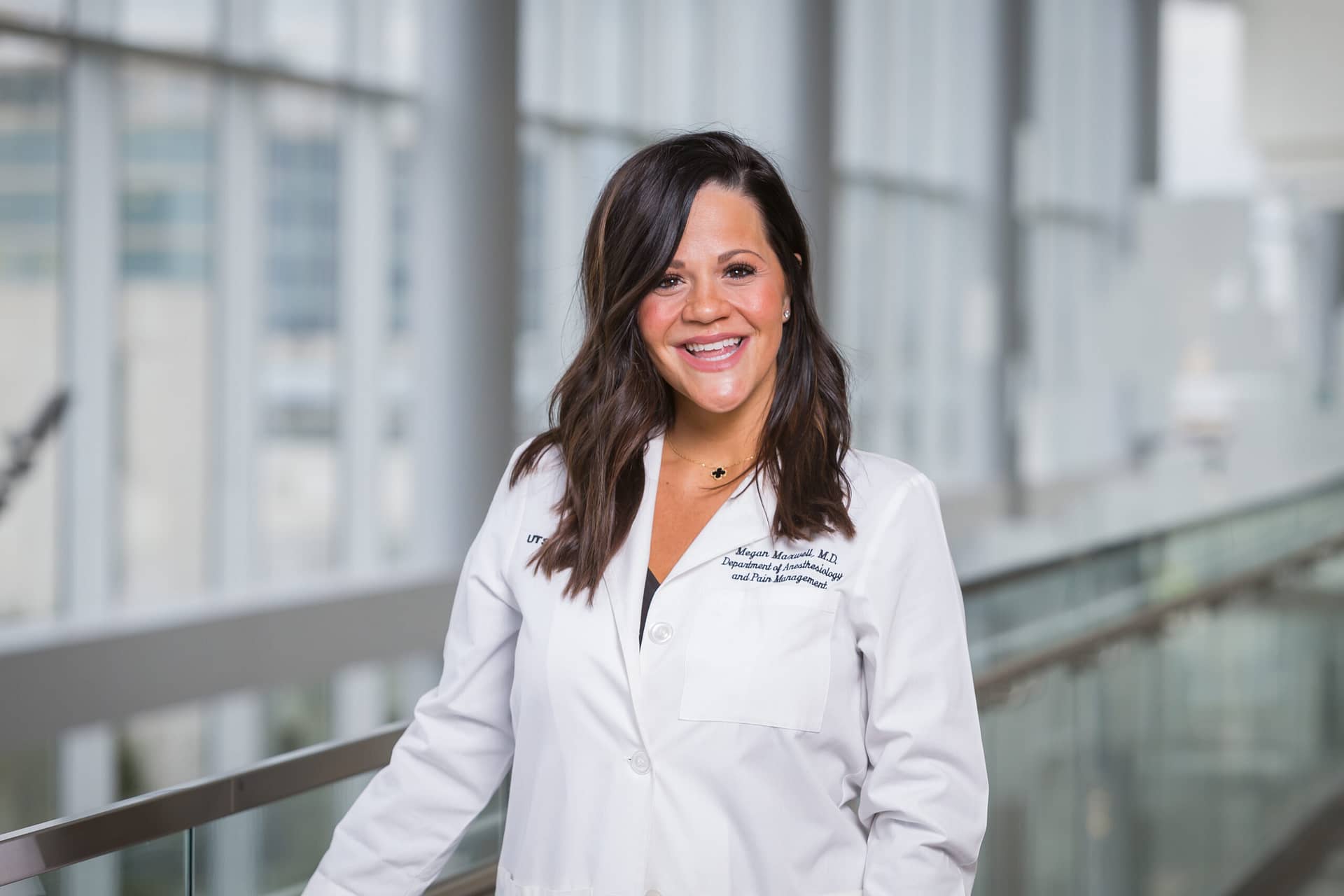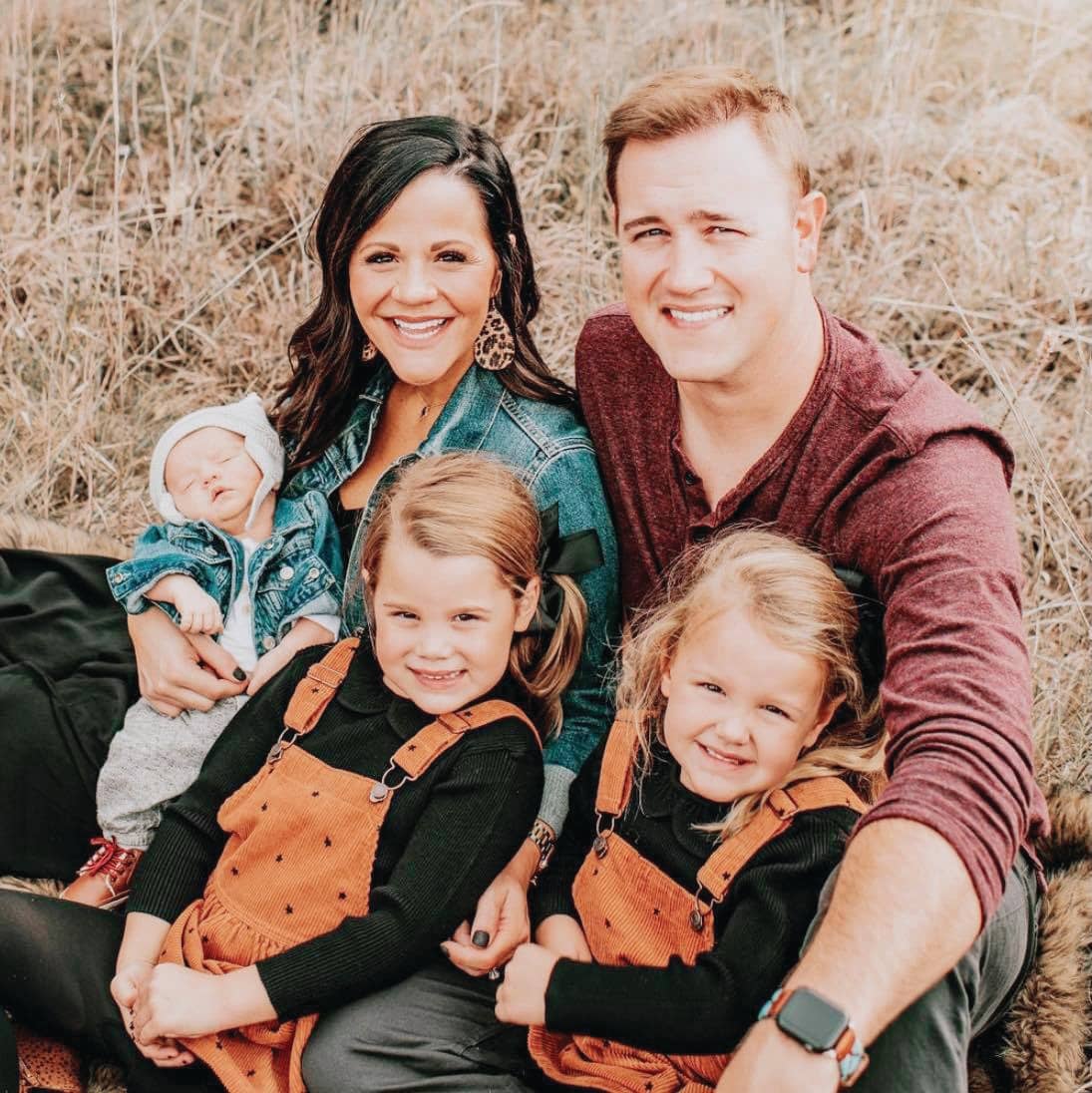Enlarge

In the early days of the pandemic, Megan (Gentry ’06) Maxwell, M.D., had one N95 mask.
As an anesthesiologist at The University of Texas Southwestern Medical Center, she needed one at all times on the job. But that type of personal protective equipment (PPE) was in short supply. So she wore it every day for six weeks.
“I would dry it out at night, and I even figured out a way to sterilize it in the oven,” Maxwell recalled. “That was all we had. There just was not enough equipment, and we were trying to protect everyone the best we knew how.”
Lack of PPE was one of the first, but hardly one of the biggest hurdles Maxwell faced as she helped guide one of Dallas/Fort Worth’s top hospitals through a pandemic, gave birth to her third child, faced the health challenges of a newborn who arrived a month early, and experienced COVID-19 in her immediate family – all at once.
Her husband, Michael Maxwell (’07), considers his wife a rock star among rock stars for everything she was juggling. “She was pregnant and didn’t miss a single shift until the day she delivered our baby boy, Miller. It’s been a wild start,” he said.
A wild start in more ways than one.
As medical director for Pre-Operative Services, Megan oversees the Presurgical Testing Clinic, so she’s fully invested in patient care, often one of the first interactions for those entering the hospital. All patients having surgery or procedures done at UT Southwestern funnel through her clinic. As assistant professor in the Department of Anesthesiology and Pain Management, she’s also responsible for teaching and supervising residents.
When the nation began to shut down as the novel coronavirus spread quickly across the country, most surgeries were canceled or postponed, drastically changing Megan’s role.
“All of a sudden I didn’t have as much to do in day-to-day anesthesiology, but as medical director, I had to urgently develop protocols for how to handle COVID-positive patients and how to screen all our patients,” she said.
Enlarge

Photo by Leigh Hassan
Megan took charge of the pre-procedure universal screening, writing new procedures and working on multidisciplinary teams to determine things like how to account for patients who couldn’t travel to Dallas, how to handle referrals from surrounding counties, how to avoid contagious situations and how to handle hospital visitors.
“It was not always smooth, especially in the beginning,” she said. “We were fearful. When it first started, we didn’t understand as much as we’ve grown to understand now. We didn’t know what risks we were facing and exactly how transmission would occur.”
Adding to that fear was Maxwell’s own pregnancy and the question of risks that might entail.
She delivered her first son, Miller, in late August, about a month ahead of her due date, and he stayed in the Neonatal Intensive Care Unit with breathing problems for the first week. Megan visited him in the NICU until the day before Miller was scheduled for discharge, when the Maxwells’ nanny alerted them she was COVID positive.
“I was distraught,” Megan recalled. “I was really on the edge of a cliff – terrified that I had exposed the baby, the NICU, the hospital staff, other babies who might be even sicker. It was awful.”
Megan immediately left the NICU and took the whole family for testing. Fortunately for her concerns about exposure in the hospital, she and Michael were negative, but their 5-year-old daughter, Marlo, was positive.
With baby Miller about to be discharged yet still requiring oxygen, and a COVID-positive child at home, Megan made the difficult decision for her and Miller to temporarily move in with a friend while Michael and their daughters quarantined at home.
“It was certainly stressful,” Megan said. “My husband really didn’t get to see his new son for nearly three weeks. That was so hard. But thankfully everyone stayed well. Our daughter, although positive, was fine.”
Still, the separation took its toll, as the Maxwells faced a situation many have encountered over the last year: isolation from loved ones.
“I think a theme, not just in my life but throughout the pandemic, is loneliness,” she said. “I was lonely being the only one staying with the baby in NICU since only one parent could visit. My husband was lonely having to quarantine with the girls without me or the baby. And of course, we had it easy compared to some. People are dying alone, having babies alone, in the NICU alone, struggling with cancer alone.”
Instead of being discouraged by her own experience, Megan channeled it toward compassion and understanding for her patients.
Although this was incredibly stressful and heartbreaking to go through, it’s given me so much more empathy for those who have sick children.
“Although this was incredibly stressful and heartbreaking to go through, it’s given me so much more empathy for those who have sick children,” she said. “I haven’t been in the position of being a patient in a long time, and it’s hard to be a patient and feel like you can’t control what’s going on. Health care can be slow, costly and time consuming. Of course, you do it at any cost to make sure your child is well, but it was eye-opening to be on the other side. Now when I get a call from a frustrated family member, I really get it. I know how hard and frustrating this is. I hope that makes me a better physician.”
Her colleagues confirmed her excellence as a physician when she received the Rising Star Award for 2020, one of UT Southwestern’s clinical excellence honors that “recognizes exceptional early-career clinical faculty whose actions and activities consistently exemplify enthusiasm, commitment, professionalism and leadership.”
Her rise to the occasion continues as the pandemic still grips the world, but vaccines offer a glimpse of light ahead – a light Megan has seen firsthand in her own profession.
“I certainly, along with everyone, am really hopeful for when the pandemic is over. No one can deny the negatives we’ve faced, but if I have to look at the silver lining, I’ve marveled at not just the speed of the vaccine but people working together,” she said. “This desperate time has demanded we all come together to triage, to solve problems. I’m amazed at the multidisciplinary communication, cooperation and progress. I see staff members at the end of a case come out of the room covered in sweat, with deep mask lines impressed on their face. I see different people who I work with rise up in leadership roles. I’ve been able to develop relationships with people I would not normally work with. I think it’s all really stretched me as a leader.”
– Robin Saylor
May 14, 2021
